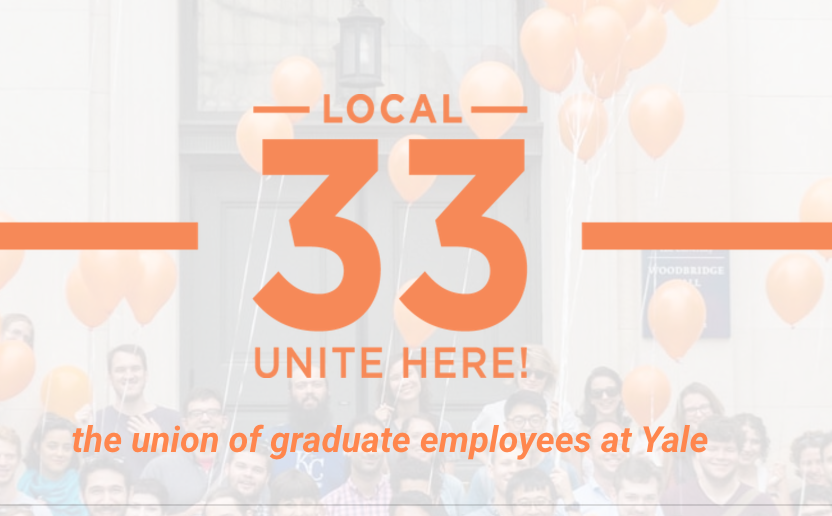by Sol Hilfinger-Pardo
I came to Yale because of its reputation for progressive values, and the support I hoped I would receive to do the public interest work that most needs doing.
But my view has changed as I’ve watched the institutional inertia and cowardice of the Yale administration on so many issues—from failing to publically denounce the Muslim travel ban, to refusing to rename Calhoun and defending Stephen Schwarzman’s ties to Trump. Now Yale’s hypocritical antics have become personal for me in a way I couldn’t have predicted.
The Yale administration is currently trying to disenfranchise me. I don’t mean symbolically. I mean they are literally asking the federal government to shred the ballot I cast in favor of forming a union with Local 33. They want to throw out all of the votes cast by Political Science Teaching Fellows who aren’t Ph.D. students.
This semester, I’m one of many TFs in the Political Science Department who are also law students. I’m a TF for the Political Science course “Bioethics and Law.” I have a background in the material and enjoy teaching, as well as creating a supportive environment for women, people of color, and students with disabilities in the Political Science classroom—the kind of support I wish I’d found more of. And I was one of 25 non-Ph.D. student TFs who voted in the Political Science graduate-teacher union election. 20 of us, or more, voted for the union.
How do I know that number? Yale is urging the National Labor Relations Board to throw out our votes. So 20 of the 25 non-Ph.D. voters in Political Science signed a letter informing Yale that we voted yes and asking it to drop its efforts to disenfranchise us. Today, we’re delivering it.
Our letter shows that graduate teachers in Political Science have won a union, with or without our votes. Yale’s efforts just mean they want some of us to go without representation when we teach in the Department. Yale is also attempting to disenfranchise Master’s students who voted in the East Asian Languages and Literatures Department election. 94% of them signed a similar letter and they’re delivering it today too.
In trying to shut us out, the administration is making an argument that does not make sense. Yale claims that I don’t have enough work-related interests in common with other Political TFs to vote in the same election and negotiate together about our working conditions in the Department.
This is ridiculous. I have almost identical working conditions as Political Science TFs who are PhD students and the Department has primary control over those conditions. I got hired through an official appointment letter from the Department—which it could do because Yale gave it a certain number of TF hours to distribute as it saw fit to courses the Department manages. The Department chose to devote some of those to TF position in the class I teach.
I got hired because I have the skills and training to teach the course—a course related to the political interactions of judicial and legislative institutions. I have spent much of my law school career studying how politics and political inclinations affect legal outcomes. The law school has trained me to teach undergraduates about these subjects. I run discussion sections, grade student work, hold office hours, and master the syllabus, lectures, and course material to teach that specialized subject matter. And I’m not unusual—each semester, the Political Science Department advertises TF positions across the university and law students like me apply for—and are hired—to fill positions for which the Department faculty decide they are qualified.
Teachers for the Department all have input about how it distributes, hires, and manages TFs, and we should get to negotiate with Yale about those issues. I can’t imagine that Yale’s argument will work. But they may have found a shortcut around justice. They may not need to rely on their weak arguments to win—and here’s my hunch about why they’re putting up these procedural hurdles. Federal bureaucracy moves slowly. If Yale stalls long enough, its delay could win more than our disenfranchisement.
Eventually, the Trump administration is expected to appoint new, anti-union members to the NLRB. The administration has not agreed to begin contract negotiations even in departments where the union won sweeping victories. If Yale delays long enough, a Trump NLRB could overturn Columbia, the decision that restored collective bargaining rights to tens of thousands of graduate teachers. Yale has cynically fought the Columbia decision at every opportunity. For a Yale administration that aims to avoid sitting eye-to-eye with its teachers—who have the legal right to negotiate—what better prize than to strip them of that right?
I would like to believe that Yale wouldn’t hide behind Trump just to avoid treating its employees with respect. I want to be part of the Yale that is committed to improving the world today, not the Yale that refuses to start by improving the lives of its own community members.
So, President Salovey, even if you’d rather not know how I voted, I hope you’re reading this column. I’m calling on you to stop your legal appeals, stop trying to disenfranchise us, and stop hiding behind Trumps’ expected union-busting. Show us that Yale is better than that.


